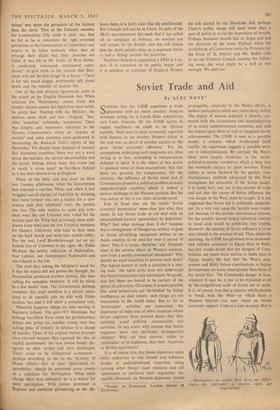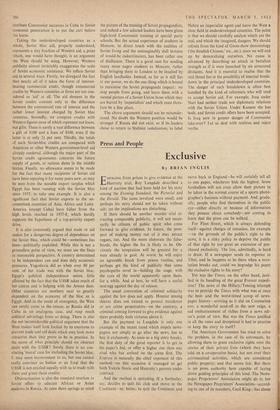Soviet Trade and Aid
By ALEC NOVE*
',agreement that the USSR negotiates a trade ',agreement with an Asian country. Suppose salesmen acting for a Czech State corporation visit Latin America. Or the USSR agrees to supply machinery on credit to an African republic. Such news is 'quite commonly regarded with dismay, as yet another Western defeat in the cold war, as proof of another success in 'the. great Soviet economic offensive.' Yet the assumptions underlying such judgments are often wrong as to fact, misleading in interpretation, defeatist in spirit. It is the object of this article to question some of these assumptions. Not that there are grounds for complacency. On the contrary, the influence of Soviet ideas and of Communism presents a political problem in many underdeveloped countries which is indeed a serious challenge to the Western position. But the real nature of this is too often misunderstood.
Few of those who use the words `Soviet economic penetration' seem clear just what they mean. Is any Soviet trade or aid deal with an uncommitted country 'penetration' by definition? Why? Just what damage does it do? Suppose that a consignment of Hungarian railway wagons or Soviet oil-drilling equipment arrives in an Asian country, to be paid for over a period of years. This is a credit, therefore `aid.' Precisely what is the adverse effect on Western interests, save from a purely commercial standpoint? Why should we exert ourselves to prevent such deals? The typical answer to such a question is a pity- ing look : the naïve critic does not understand that Soviet technicians may accompany the goods, and that these are bound to be carriers of the germs of subversion. Of course, it is quite. possible that some technicians are 'de-briefed' by Soviet intelligence on their return; such things are not uncommon in the world today. But so far as `penetration' activities are concerned, the experience of India and of other countries where Soviet engineers have worked shows that they carefully avoid political conversation and activities. In any event, why assume that Soviet engineers have any particular propagandist abilities? Why are they cleverer, either as `politicians' or as engineers, than their American or British equivalents?
It is, of course, true that Soviet diplomats make every endeavour to win friends and influence people in underdeveloped countries, using (among other things) trade relations and aid agreements to reinforce their arguments. So, equally obviously, do Western diplomats. Soviet * Reader in Economics, London School of Economics. propaganda, relatively to the West's efforts, is neither particularly subtle nor particularly skilful. The degree of success achieved is directly con- nected with the frustrations and dissatisfactions of so many underdeveloped countries, and with the impact upon them of real or imagined Soviet achievements. The USSR is seen as a possible model, a country which modernised itself rapidly. Its experience suggests a possible short cut to industrialisation. By contrast, the West's ideas seem largely irrelevant to the social- political-economic revolution which a leap into the twentieth century so often involves. Every failure to move forward by the gentler, non- revolutionary methods advocated by the West strengthens the attraction of the Soviet model. It is surely here, and not in the amount of trade and aid, that the causes of Soviet influence, the real danger to the West, must be sought. It is not suggested that Soviet aid is politically insignific- ant. In a very real sense the Soviets must render aid, because, in the present international climate, for the world's second largest industrial country to stand aside would be politically very foolish. However, the amount of Soviet influence is in no way related to the amount of aid. Thus, relatively speaking, the USSR has provided more economic and military assistance to Egypt than to India, but few would doubt that the dangers of Com- munism are much more serious in India than in Egypt, despite the fact that the West's past, present and likely future contributions to Indian development are many times greater than those of the Soviet bloc. The Communist danger in Iran, whatever it may be, is not to be explained at all by the insignificant scale of Soviet aid or trade. It is, of course, true that a country which chooses to break with the West—or which faces a Western boycott—can now count on Soviet economic support. Cuba is a case in point. But to --Remember; no mailer how deep our differ- ences-- the portcullis i,c always open for negotiation.' attribute Communist successes in Cuba to Soviet economic penetration is to put the cart before !he horse.
Taking the underdeveloped countries as a whole, Soviet bloc aid, properly understood, represents a tiny fraction of Western aid, a point which, one would have thought, is an argument the West should be using. However, Western publicity almost invariably exaggerates the scale of Soviet economic assistance. We inflate Soviet aid in several ways. Firstly, we disregard the fact that nearly all of it' takes the form of interest- bearing commercial credit, though commercial credits by Western countries or firms are not con- sidered as 'aid' at all. The aid element in the Soviet credits consists only in the difference between the commercial rate of interest and the rather lower interest charged by Soviet bloc countries. Secondly, we compare credits with Western figures most of which represent not loans, but gifts. There is surely a vast difference between a gift of $100 and a loan of $100, even if the latter is at only 24 per cent. Thirdly, the totals of such Sbviet-bloc credits are compared with American or other Western government-level aid already rendered, although the major part of the Soviet credit agreements concerns the future supply of goods, at various dates in the middle Sixties. Finally, no allowance seems to be made for the fact that many recipients of Soviet aid have been repaying it for some years now, as may be seen from the sizeable export surplus which Egypt has been running with the Soviet bloc since 1957, to take one example. It is also a significant fact that Soviet exports to the un- committed countries of Asia, Africa and Latin America (except Cuba) have fallen from the high levels reached in 1957-8, which hardly supports the hypothesis of a top-priority export drive.
It is also commonly argued that trade or aid makes for a dangerous degree of dependence on the Soviet bloc, which could be—sometimes has been—politically exploited. While this is not a groundless point of view, we must see the facts in reasonable perspective. A country determined to be independent can and does defy economic pressures. Yugoslavia did so when over 80 per cent, of her trade was with the Soviet bloc. Egypt's political independence seems little affected by the fact that the USSR takes much of her cotton and is helping with the Aswan dam. Other countries are nowhere near so greatly dependent on the economy of the bloc as is Egypt. And in the event of emergency, the West can surely come to the rescue, as Russia did in Cuba in an analogous case, and reap much political advantage from so doing. There is also the not inconsiderable political argument that the West makes itself look foolish by its exertions to prevent trade and aid deals which may look more attractive than they prove to be in practice. In the name of what principle should we obstruct deals with the USSR? Surely there is no con- vincing 'moral' case for excluding the Soviet bloc. It may seem inconvenient to us, but one cannot really convince an Indian or an Iraqi that the USSR is not entitled equally with us to trade with them and grant them credits.
Obstructionism is also the standard reaction to Soviet offers to educate African or Asian students in Russia. At once there springs to mind the picture of the training of Soviet propagandists, and indeed a few selected leaders have been given high-level Communist training at special party schools. But the actual experience of students in Moscow, in direct touch with the realities of Soviet living and the unimaginably dull lectures of would-be indoctrinators, has been rather one of disillusion. There is a good case for sending many more negro students to Moscow, rather than bringing them to London to be insulted by. English landladies. Instead, as far as it still lies in our power, we do the one thing which is bound to maximise the Soviet propaganda impact: we stop people from going, and leave them with a mental picture of a Soviet Union from which they are barred by 'imperialists' and which must there- fore be a fine place.
The above arguments should not be misunder- stood. No doubt the Western position would be stronger if Russia did not exist, or if its leaders chose to return to Stalinist isolationism, to label Nehru an imperialist agent and leave the West a clear field in underdeveloped countries. The point is that we should carefully analyse which are the real, and which the imagined, dangers. We should refrain from the kind of Goon-show demonology (`the fiendish Chinese,' etc., etc.), since we will end up by demoralising ourselves. No cause is advanced by describing an attack in battalion strength as if it were launched by six armoured divisions. And it is essential to realise that the teal threat lies in the possibility of internal break- down in the principal underdeveloped countries. The danger of such breakdown is often best handled by the kind of reformers who will tend to accept Soviet aid. For example, Iraq under Nuri had neither trade nor diplomatic relations with the Soviet Union. Under Kassem she has both, and Soviet credit offers have been accepted. Is Iraq now in greater danger of Communist take-over? Let us deal with realities and reject myths.



































 Previous page
Previous page